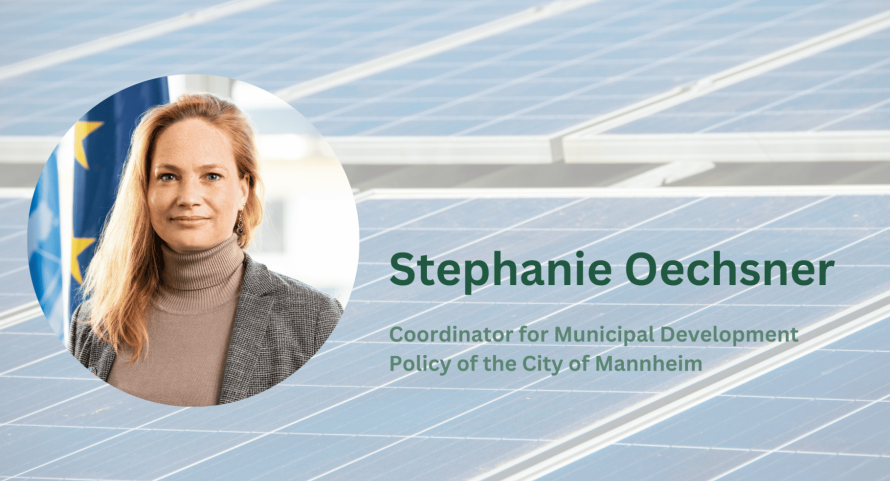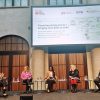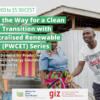“We are in new territory here” – Financing municipal climate projects with emission certificates

The cities of Mannheim and Freetown want to use emission certificates to realize climate investments in Sierra Leone and enable Mannheim-based companies to offset their CO2 emissions. They are developing the roadmap for this with financial support from Green People’s Energy. It is a project with a win-win component, says Stephanie Oechsner in the interview. She is the coordinator for municipal development policy in the city of Mannheim.
With the support of Green People’s Energy, you want to create a roadmap on how municipal climate investments can be generated with the help of carbon credits. Why specifically with the city of Freetown in Sierra Leone?
Stephanie Oechsner: Cooperation between the City of Mannheim, Germany, and Freetown, Sierra Leone, goes back to a joint commitment by both mayors in the Global Parliament of Mayors (GPM). The GPM brings together mayors from around the world to pool the experience and expertise of municipalities, promote city diplomacy and highlight the pioneering role that municipalities play in tackling global challenges such as climate protection, migration and mobility. Since November 2019, Mannheim’s Lord Mayor Dr Peter Kurz has been Chairman of the GPM. Yvonne Aki-Sawyer, Mayor of Freetown, is an active member in the network. Through the regular activities within the GPM, a strong partnership has established not only between mayors, but also between the administrations of the City of Mannheim and the City of Freetown. Our two cities are linked by their comprehensive commitment to local implementation of the Sustainable Development Goals (SDGs). Climate protection and adaptation to climate change are a field in which we want to work together.
The starting conditions of both cities are very different. What do the cities have in common?
Stephanie Oechsner: Both cities have adopted ambitious climate targets. We want to become climate neutral by 2030 and contribute to achieving this goal with our international partnership work. Freetown wants to reduce its CO2 emissions by five percent by 2025 compared to 2005 levels, by 10 percent by 2030 and by 25 percent by 2050. That is a lot, considering Freetown is growing fast, Sierra Leone is one of the poorest countries in the world and is already particularly affected by heavy rain, flooding and heat waves as far as climate impacts are concerned. Emission certificates can generate the necessary investment funds from which the inhabitants of both cities can benefit by financing climate protection measures.
In what way?
Stephanie Oechsner: If we as the city of Mannheim want to become climate-neutral by 2030, not only do municipal institutions, but also companies located here need to drastically reduce their CO2 emissions. Unfortunately, as things stand today, not all greenhouse gas emissions can be avoided. Investing in climate protection projects through emission certificates is one possible way to compensate for unavoidable greenhouse gas emissions.
Many companies in Mannheim and the region already invest in carbon offset projects to improve their carbon footprint. By developing a CO2 offset project in Freetown that is certified according to international standards, we would like to combine our goal of contributing to the reduction of greenhouse gas emissions with our international partnership work and the private sector’s goals of improving its own climate footprint. The aim is to enable the private sector to improve its own climate footprint by investing in a carbon offset project through the development of renewable energy in Freetown, while at the same time supporting the international development cooperation of its own municipality.
Freetown, in turn, needs financial resources to invest in both climate protection and a better supply of energy for the population. So, cooperation makes a lot of sense. As cities facing the same global challenges, including climate change, benefit from the exchange of experience and mutual knowledge transfer in the field of climate and environmentally friendly energy supply, and at the same time develop a financing model to promote renewable energies in Freetown and counter climate change at the local level.
Is there a role model for the roadmap?
Stephanie Oechsner: As far as municipal projects are concerned, no. As far as we know, we are entering completely new territory here.
How do you plan to achieve your goal?
Stephanie Oechsner: With financial support from Green People’s Energy, we were able to hire a consulting institute that specialises in developing projects to reduce greenhouse gas emissions according to international standards. It moderates and accompanies us through the entire process. At the end of February 2023, we held the first of three virtual workshops. From our discussions, the institute formulated a detailed roadmap. With that, we can venture into implementation.
What questions do you still have to answer?
Stephanie Oechsner: Lots of them. The subject matter is very complex. After the first workshop, everyone’s head was spinning. But we have now laid the foundation, exchanged ideas about how such projects can be set up, what conditions must be met, what data we still must provide, how we can measure emissions and prove them in such a way that we can also credit them.
In which thematic field do you want to get involved?
Stephanie Oechsner: That is not yet clear. But of course, we want to concentrate on areas where we can achieve the greatest possible CO2 savings relatively quickly. Three fields are currently under discussion: Firstly, energy production from organic waste, secondly, the substitution of firewood by solar water heating and thirdly, the efficient use or substitution of firewood using clean and efficient cookers.
What criteria will you use to decide?
Stephanie Oechsner: In addition to the ecological aspect, we also consider the social impact. Where we can substitute firewood, the main beneficiaries are women, who usually must collect the firewood and handle the open fires. The toxic smoke endangers their health and that of their children. The growing demand for firewood also leads to the disappearance of forests near cities, although they need to be preserved for the urban climate and climate protection. The reduction in logging goes hand in hand with Freetown’s goal of planting one million trees. The consulting firm will now prepare the advantages and disadvantages of the respective investments.
What role does the methodology play with which you have to prove the savings?
Stephanie Oechsner: There are different standards with which we can prove the savings. We tend to use the Gold Standard, which applies particularly strict criteria. However, this makes the investment per ton of C02 more expensive and the price of the emission certificates. But one challenge remains. To be able to generate emission certificates, we have to pre-finance projects. The further process will show how we can do this.
Why are you undertaking this adventure?
Stephanie Oechsner: Because the goal is worthwhile. Once we have drawn up the roadmap and successfully launched the project, we set a benchmark in the best case. And we show a roadmap for how municipalities, with the involvement of the private sector, can realise their climate goals through their international partnership work. Addressing the issue also increases our municipal knowledge in this important topic area. So, this is not a wasted labour of love.
Have you already contacted Mannheim-based companies?
Stephanie Oechsner: No, it is too early for that. First, we need the roadmap and the detailed timetable that goes with it. In any case, Mannheim already has the Climate Protection Alliance, in which Mannheim companies have joined forces to work towards the city-wide goal of achieving climate neutrality by 2030. It is moderated at the municipal level by the Climate Protection Department. The colleagues from the Climate Protection Department are actively involved in our project with Freetown. So the distances are very short.
About
Stephanie Oechsner is the Coordinator for Municipal Development Policy of the City of Mannheim and an employee of the International Affairs, Europe and Protocol Department. Since 2019, the city’s commitment to development policy has been part of the Mannheim 2030 mission statement.





